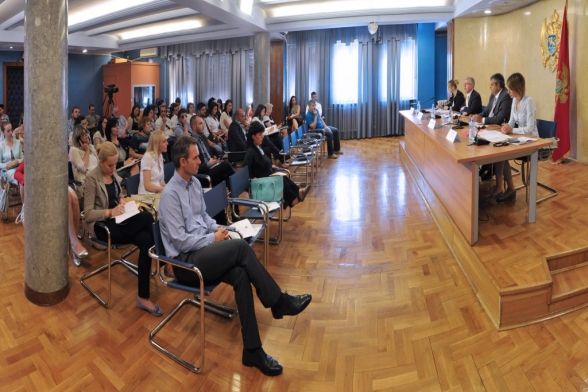Today, theCommittee on European Integration organised a public debate on the topic “Legislation of Montenegro and the EU in chapters 15 - Energy and 19 - Social policy and employment”, in the Blue Room of the Parliament of Montenegro.
Mr Slaven Radunović, Chairperson of the Committee on European Integration of the Parliament of Montenegro, was the moderator of the public debate, while the panellists were: Mr Alberto Cammarata, Head of Political, European Integration and Trade Section at the EU Delegation to Montenegro; Ms Angelina Živković, Acting Director General of the Directorate of Public Roads at the Ministry of Transport and Maritime Affairs and member of the Negotiation Group for Chapter 15 – Energy, and Ms Arijana Nikolić-Vučinić, Acting Director General of the Directorate for Preschool and Primary Education and Education of Persons with Special Educational Needs at the Ministry of Education and member of the Negotiation Group for Chapter 19 – Social policy and employment.
In his introductory statement, Chairperson of the Committee Mr Slaven Radunović presented the legislative framework and basic aspects of chapters 15 and 19, and pointed out that both topics strongly affected the everyday lives of the citizens. In the energy area, as he said, the key global goal is the increase of energy efficiency which could significantly contribute to improvement of the quality of life, stimulation of innovation and employment, and economic growth. On the other hand, the field of social policy and employment entailed the fight against the challenges such as long-term unemployment, youth unemployment, the discrepancy between the available and the required skills of the workforce, regional differences in the level of employment, and employment discrimination.
Head of Political, European Integration and Trade Section at the EU Delegation Mr Alberto Cammarata pointed out that the energy policy should be based on diversification, competition, and sustainability, and in that sense the European Union was working on establishing a new freedom – free energy flow, in the context of establishing the Energy Union. With regard to social policy and employment, he called this chapter the crossroad between the political and economic criteria. Mr Cammarata especially emphasised the work of the European Social Fund, due to which 15 million of European citizens per year improved their work skills in order to find employment.
Negotiator for Chapter 15 Ms Angelina Živković presented the tasks that Montenegro would be facing in the following stages of negotiations. She pointed out that Montenegro had largely harmonised its legislation with the acquis, and that the drafting of a new energy law was underway, which would make the country completely harmonised with the Third Energy Package. She added that the only measure for opening of this chapter was the adoption of a detailed action plan for harmonisation with the directive prescribing maintenance of minimum reserves of crude oil and/or its derivatives.
Negotiator for Chapter 19 Ms Arijana Nikolić-Vučinić said that the EU acquis in this field consisted of labour law, health, and safety at work, equal treatment of men and women regarding employment and social security, employment policy, and social dialogue. Furthermore, there were special binding rules with regard to prohibition of discrimination on the base of race and ethnicity, religion and faith, disabilities, age, and sexual orientation. Ms Nikolić-Vučinić pointed out that in March the Government adopted the Action Plan for Chapter 19, which was also an opening benchmark for opening of the Chapter.
During the debate, the participants were interested in the possibilities of employing persons with disabilities, projects for promotion of energy efficiency, and various models of resolving the problems with energy supply. The representatives of the NGOs also discussed the need for a stronger cooperation of the state institutions and the non-governmental sector, not only through working groups, but also in the overall negotiation process.









